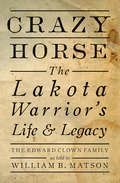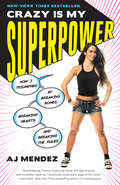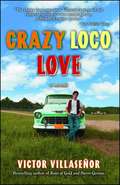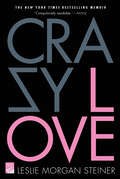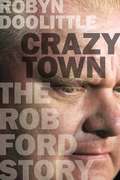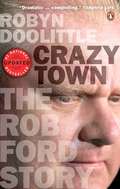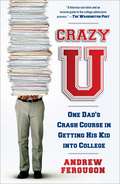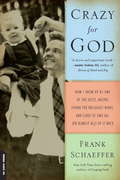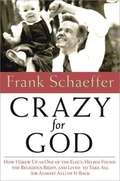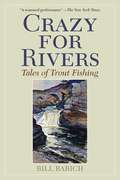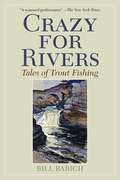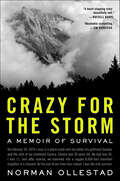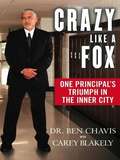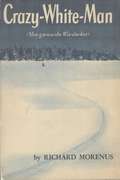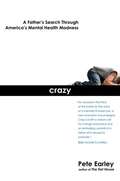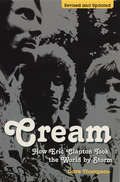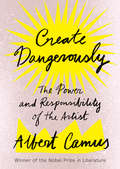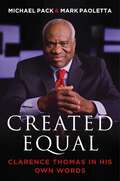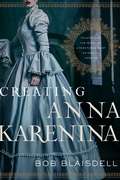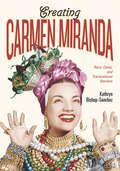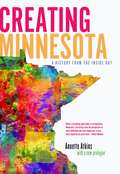- Table View
- List View
Crazy Horse: The Lakota Warrior's Life & Legacy
by The Edward Clown Family&“A family account of the life of Tashunke Witko, their great Sioux relative . . . For the first time, the Clown family members tell their oral history.&”—True West The Edward Clown family, nearest living relatives to the Lakota war leader, presents the family tales and memories told to them about their famous grandfather. In many ways the oral history differs from what has become the standard and widely accepted biography of Crazy Horse. The family clarifies the inaccuracies and shares their story about the past, including what it means to them to be Lakota, the family genealogy, the life of Crazy Horse and his motivations, his death, and why they chose to keep quiet with their knowledge for so long before finally deciding to tell the truth as they know it. This book is a compelling addition to the body of works about Crazy Horse and the complicated and often conflicting events of that time period in American History. &“For the first time the first-hand account of Crazy Horse is told . . . The stories were faithfully passed down through the generations . . . It includes Crazy Horse&’s account of the last moments of Custer and the near-killing of Maj. Marcus Reno by Crazy Horse&’s father.&”—Capital Journal &“After many years of keeping quiet, the family of Lakota warrior Crazy Horse decided to tell their story of his life and legacy . . . The truth behind the history of Crazy Horse—an iconic Native American warrior—until recently has been kept hidden for more than a century.&”—The Monroe News
Crazy Is My Superpower: How I Triumphed by Breaking Bones, Breaking Hearts, and Breaking the Rules
by A.J. Mendez BrooksRecently retired WWE superstar AJ Mendez Brooks is a powerhouse—strong, quirky, and totally confident. But that wasn’t always the case. With humor and tremendous heart, she opens up for the first time about her harrowing struggle to understand her demons and the diagnosis that helped her gain control over her life. Everything I was told should be my greatest insecurities and weaknesses, everything that I’ve been labeled—SHORT, NERDY, SKINNY, WEAK, IMPULSIVE, UGLY, TOMBOY, POOR, REBEL, LOUD, FREAK, CRAZY—turned out to be my greatest strengths. I didn’t become successful in spite of them. I became successful because of them. Growing up AJ was a quiet girl trying to act “normal” when she felt anything but. As her family struggled with drug addiction, poverty, and mental illness, she found escape through comic books and video games, and was inspired by the tough and unconventional female characters. It wasn’t until she discovered pro wrestling that she learned superheroes could be real. Determined to become the superhero she’d always admired, AJ trained and sacrificed for years to achieve her dream of wrestling professionally. Yet she quickly faced industry pressure to play the role of the damsel in distress and to dress more provocatively to cater to male fans. But she fought back and created an ass-kicking alter ego that was a genuine representation of herself: nerdy, enthusiastic, and a little bit crazy. With humor and tremendous heart, AJ opens up for the first time about her harrowing struggle to understand her demons and the mental illness diagnosis that helped her gain control over her life. What most people view as a hardship, AJ embraced as inspiration for her superhero persona, shattering the stigma attached to mental illness. Charting her journey from a scrappy girl in an unstable home to an empowered wrestling champion, Crazy Is My Superpower is an unflinchingly honest story and brave confessional about her long road to self-acceptance.
Crazy Loco Love: A Memoir
by Victor VillaseñorGrowing up on his parents' ranch in North San Diego County, Victor Villaseñor's teenage years were marked by a painful quest to find a place for himself in a world he did not fit into. Discriminated due to his Mexican heritage, Victor questions the tenets of his faith and the restrictions it places on his own spirituality and sexuality. Ultimately, his search for identity takes him to Mexico to learn of his family's roots, where he soon discovers that his heritage doesn't determine his intelligence or success. Through this often humorous and poignant tale, Victor deftly undermines the macho stereotype so often associated with Latinos, while exposing the tender vulnerability and naÏvetÉ of a young man grappling with the roles foisted on him by the church and society. Victor's youthful misadventures elicit sympathy, laughter, and tears as he attempts to divine the mysteries of the opposite sex in this powerful, revealing memoir. "The clarity that comes from Villaseñor's personal and cultural experience is not matched in any of Steinbeck's major works" (Los Angeles Times).
Crazy Love
by Leslie Morgan SteinerThe New York Times bestseller: “[A] brutally honest memoir of a brave, smart, fresh-faced young woman’s descent into domestic hell.” —Monica Holloway, author of Driving with Dead PeopleAt 22, Leslie Morgan Steiner seemed to have it all: a Harvard diploma, a glamorous job at Seventeen magazine, a downtown New York City apartment. Plus a handsome, funny, street-smart boyfriend who adored her. But behind her façade of success, this golden girl hid a dark secret. She’d made a mistake shared by millions: she fell in love with the wrong person.At first Leslie and Conor seemed as perfect together as their fairy-tale wedding. Then came the fights she tried to ignore: he pushed her down the stairs of the house they bought together, poured coffee grinds over her hair as she dressed for a critical job interview, choked her during an argument, and threatened her with a gun. Several times, he came close to making good on his threat to kill her. With each attack, Leslie lost another piece of herself.Gripping and utterly compelling, Crazy Love takes you inside the violent, devastating world of abusive love. Conor said he’d been abused since he was a young boy, and love and rage danced intimately together in his psyche. Why didn’t Leslie leave? She stayed because she loved him. Find out for yourself if she had fallen truly in love—or into a psychological trap. Crazy Love will draw you in—and never let go.“Compulsively readable.” —People“A must read for anyone in a consuming relationship.” —Iris Krasnow, New York Times–bestselling author
Crazy Town
by Robyn DoolittleHis drug and alcohol-fuelled antics made world headlines and engulfed a city in unprecedented controversy. Toronto Mayor Rob Ford's personal and political troubles have occupied centre stage in North America's fourth largest city since news broke that drug dealers were selling a videotape of Ford appearing to smoke crack cocaine. Toronto Star reporter Robyn Doolittle was one of three journalists to view the video and report on its contents in May 2013. Her dogged pursuit of the story has uncovered disturbing details about the mayor's past and embroiled the Toronto police, city councillors and ordinary citizens in a raucous debate about the future of the city. Even before those explosive events, Ford was a divisive figure. A populist and a successful city councillor, Ford was an underdog to become mayor in 2010. His politics and mercurial nature have split the amalgamated city in two. But there is far more to the story. the Ford family has a long, unhappy history of substance abuse and criminal behavior. Despite their troubles, they are also one of the most ambitious families in Canada. Those close to the Fords say they often compare themselves to the Kennedys and believe they were born to lead. and regardless of whether the mayor survives the current crack cocaine scandal, Doolittle argues, the Ford name will be on the ballot in the mayoralty election in 2014. Fast-paced and packed with shocking revelations, Crazy Town is a page-turning portrait of a troubled man, a formidable family and a city caught in an astonishing scandal.
Crazy Town (us Edition)
by Robyn DoolittleHis drug and alcohol-fuelled antics made world headlines and engulfed a city in unprecedented controversy. Toronto Mayor Rob Ford's personal and political troubles have occupied centre stage in North America's fourth largest city since news broke that men involved in the drug trade were selling a videotape of Ford appearing to smoke crack cocaine. Toronto Star reporter Robyn Doolittle was one of three journalists to view the video and report on its contents in May 2013. Her dogged pursuit of the story has uncovered disturbing details about the mayor's past and embroiled the Toronto police, city councilors, and ordinary citizens in a raucous debate about the future of the city. Even before those explosive events, Ford was a divisive figure. A populist and successful city councillor, he was an underdog to become mayor in 2010. His politics and mercurial nature have split the amalgamated city in two. But there is far more to the story. The Fords have a long, unhappy history of substance abuse and criminal behavior. Despite their troubles, they are also one of the most ambitious families in Canada. Those close to the Fords say they often compare themselves to the Kennedys and believe they were born to lead. Regardless of whether the mayor survives the scandal, the Ford name is on the ballot in the mayoralty election of 2014. Fast-paced and insightful, Crazy Town is a page-turning portrait of a troubled man, a formidable family and a city caught in an jaw-dropping scandal.
Crazy U
by Andrew FergusonThe cutthroat competition to get into the perfect college can drive students to the brink of madness and push their parents over the edge--and bury them in an avalanche of books that claim to hold the secret of success. Don't worry: Crazy U is not one of those books. It is instead a disarmingly candid and hilariously subversive chronicle of the journey that millions of parents and their children undertake each year--a journey through the surreal rituals of college admissions. It's a rollicking ride from the man Christopher Buckley has called "my all-time favorite writer." Pummeled by peers, creeped out by counselors, and addled by advice books, Andrew Ferguson has come to believe that a single misstep could cost his son a shot at a happy and fulfilling future. He feels the pressure to get it right from the moment the first color brochures land in his mailbox, sent from colleges soliciting customers as though they were sailors come to port. First is a visit with the most sought-after, most expensive--and surely most intimidating--private college consultant in the nation. Then come the steps familiar to parents and their college-bound children, seen through a gimlet eye: a session with a distracted high school counselor, preparations for the SAT and an immersion in its mysteries, unhelpful help from essay coaches and admissions directors, endless campus tours, and finally, as spring arrives, the waiting, waiting, waiting for the envelope that bears news of the future. Meanwhile, Ferguson passes on the tips he's picked up during their crash course. (Tip number 36: Don't apply for financial aid after midnight.) He provides a pocket history of higher education in America, recounts the college ranking wars, and casts light on the obscure and not-terribly-seemly world of higher-education marketing. And he dares to raise the question that no one (until now) has been able to answer: Why on earth does it all cost so much? Along the way, something unexpected begins to happen: a new relationship grows between father and son, built from humor, loyalty, and (yes) more than a little shared anxiety. For all its tips and trials, Crazy U is also a story about family. It turns out that the quiet boy who pretends not to be worried about college has lots to teach his father--about what matters in life, about trusting your instincts, about finding your own way. In launching his son into the world,
Crazy U: One Dad's Crash Course in Getting His Kid Into College
by Andrew FergusonThe cutthroat competition to get into the perfect college can drive students to the brink of madness and push their parents over the edge--and bury them in an avalanche of books that claim to hold the secret of success. <P><P>Don't worry: Crazy U is not one of those books. It is instead a disarmingly candid and hilariously subversive chronicle of the journey that millions of parents and their children undertake each year--a journey through the surreal rituals of college admissions. It's a rollicking ride from the man Christopher Buckley has called "my all-time favorite writer." <P><P>Pummeled by peers, creeped out by counselors, and addled by advice books, Andrew Ferguson has come to believe that a single misstep could cost his son a shot at a happy and fulfilling future. He feels the pressure to get it right from the moment the first color brochures land in his mailbox, sent from colleges soliciting customers as though they were sailors come to port. <P><P>First is a visit with the most sought-after, most expensive--and surely most intimidating--private college consultant in the nation. Then come the steps familiar to parents and their college-bound children, seen through a gimlet eye: a session with a distracted high school counselor, preparations for the SAT and an immersion in its mysteries, unhelpful help from essay coaches and admissions directors, endless campus tours, and finally, as spring arrives, the waiting, waiting, waiting for the envelope that bears news of the future. <P><P>Meanwhile, Ferguson passes on the tips he's picked up during their crash course. (Tip number 36: Don't apply for financial aid after midnight.) He provides a pocket history of higher education in America, recounts the college ranking wars, and casts light on the obscure and not-terribly-seemly world of higher-education marketing. And he dares to raise the question that no one (until now) has been able to answer: Why on earth does it all cost so much? <P><P>Along the way, something unexpected begins to happen: a new relationship grows between father and son, built from humor, loyalty, and (yes) more than a little shared anxiety. <P><P>For all its tips and trials, Crazy U is also a story about family. It turns out that the quiet boy who pretends not to be worried about college has lots to teach his father--about what matters in life, about trusting your instincts, about finding your own way.
Crazy for God: How I Grew Up as One of the Elect, Helped Found the Religious Right, and Lived to Take All (or Almos
by Frank Schaeffer"New York Times"-bestselling author Frank Schaeffer chronicles his coming of age as a rising evangelical star and his eventual journey out of the fold.
Crazy for God: How I Grew Up as One of the Elect, Helped Found the Religious Right, and Lived to Take All (or Almost All) of It Back
by Frank SchaefferFrank Schaeffer grew up in Switzerland's L'Abri, an idealistic community founded by his parents, the American evangelicals Francis and Edith Schaeffer. By the time he was 19, his parents had achieved global fame as best-selling authors and speakers, l'Abri had become a mecca for spiritual seekers worldwide -- from Barbara Bush to Timothy Leary -- and Frank had joined his father on the evangelical circuit. By the age of 23, he had directed two multi-part religious documentaries and had helped instigate the marriage between the American evangelical community and the anti-abortion movement. But as he spoke before thousands in arenas around America, published his own evangelical bestseller, and worked with such figures as Pat Robertson, Jack Kemp, Jerry Falwell, and Dr. James Dobson, Schaeffer felt alienated, precipitating his own crisis of faith and eventually resulting in his departure. Schaeffer has since become a successful secular author. He was reduced to stealing pork chops from the grocery store in LA, rather than take on any more high-paying evangelical speaking gigs. With its up-close portraits of the leading figures of the American evangelical movement, Crazy for God is a uniquely revealing and powerful memoir, which tells its story with empathy, humor, and bite.
Crazy for Rivers
by Bill Barich"That autumn, I went a little crazy for rivers."So writes Bill Barich, and this charming volume captures the essence of obsession. The hours he spent on various streams became a meditation on family, friends, and the natural world. To anyone who remembers the infinite patience of a grandfather on a lake, or the romance of a mountain getaway with a new girlfriend; to anyone who can recall each fish caught on days that were far too hot, or way too cold, or on rivers too crowded, or in canyons too steep; to anyone who has appreciated the trust of an age-old fishing partner, or marveled at the beauty of a leaping trout-to anyone, in fact, who has ever gone a little crazy for rivers, Bill Barich's wonderful memories of a season on the water and a lifetime of fishing will seem both touching and wise. This little book is a gem.
Crazy for Rivers: Tales of Trout Fishing (Lyons Press Ser.)
by Bill Barich"That autumn, I went a little crazy for rivers.”So writes Bill Barich, and this charming volume captures the essence of obsession. The hours he spent on various streams became a meditation on family, friends, and the natural world. To anyone who remembers the infinite patience of a grandfather on a lake, or the romance of a mountain getaway with a new girlfriend; to anyone who can recall each fish caught on days that were far too hot, or way too cold, or on rivers too crowded, or in canyons too steep; to anyone who has appreciated the trust of an age-old fishing partner, or marveled at the beauty of a leaping trout-to anyone, in fact, who has ever gone a little crazy for rivers, Bill Barich’s wonderful memories of a season on the water and a lifetime of fishing will seem both touching and wise. This little book is a gem.Skyhorse Publishing is proud to publish a broad range of books for fishermen. Our books for anglers include titles that focus on fly fishing, bait fishing, fly-casting, spin casting, deep sea fishing, and surf fishing. Our books offer both practical advice on tackle, techniques, knots, and more, as well as lyrical prose on fishing for bass, trout, salmon, crappie, baitfish, catfish, and more. While not every title we publish becomes a New York Times bestseller or a national bestseller, we are committed to publishing books on subjects that are sometimes overlooked by other publishers and to authors whose work might not otherwise find a home.
Crazy for the Storm: A Memoir of Survival
by Norman Ollestad“As much about a father-son relationship as it is a survival story . . . his father’s life philosophy . . . got him down the mountain and through life.” —USA TodayNorman Olstead’s New York Times–bestselling memoir Crazy for the Storm is the story of the harrowing plane crash the author miraculously survived at age eleven, framed by the moving tale of his complicated relationship with his charismatic, adrenaline-addicted father. Destined to stand with other classic true stories of man against nature—Into Thin Air and Into the Wild by Jon Krakauer; Sebastian Junger’s The Perfect Storm—it is a literary triumph that novelist Russell Banks (Affliction) calls, “A heart-stopping story beautifully told . . . Norman Olstead has written a book that may well be read for generations.”“A heart-stopping adventure that ends in tragedy and in triumph, a love story that fearlessly explores the bond between a father and son and what it means to lead a life without limits.” —Susan Cheever, award-winning author of American Bloomsbury“An elegant memoir as well as a transformative coming-of-age tale. When he leaves his father’s limp body behind on the icy plateau—giving it a final kiss and caress as it’s claimed by the snow—Ollestad takes his first perilous steps not just into survival, but into adulthood.” —New York Post“Cinematic and personal . . . Ollestad’s insights into growing up in a broken home and adolescence in southern California are as engrossing as the story of his trip down the mountain.” —Chicago Tribune“Riveting.” —Entertainment Weekly
Crazy like a Fox: One Principal's Triumph in the Inner City
by Ben Chavis Carey Blakely Michelle D. BernardThe inspiring true story of one man's determination to make a difference- and the school he changed forever. "If you act like a winner, you'll be treated like a winner. If you act like a fool, you'll be treated like a fool. " This is the golden rule set forth by Dr. Ben Chavis, the highly unorthodox principal of Oakland, California's American Indian Public Charter School, which was hailed as an "education miracle" by Governor Arnold Schwarzenegger after it was transformed from a failing "nuisance" into one of the best public middle schools in the nation. This is the story of how one man, in daring to be different, effected such stunning change. With his rigorous, no-nonsense approach, Dr. Ben Chavis debunks the myth that poor, minority, inner-city schools have little chance at academic excellence. Focusing on back-to-basics ideals, he has created a structured educational model that, combined with the enthusiasm of his students and teachers, delivers astounding results. Now, Dr. Chavis recounts how he did it-in his own words and through the stories of the extraordinary young people he's helped.
Crazy-White-Man (Sha-ga-na-she Wa-du-kee)
by Richard MorenusThe author was a businessman from New York who got tired of the "Big City" life and was unhappy for some time. He decided to move as far away from that environment. Taking only his dog, some gear, and an open heart he travelled to Canada. During this trip, he found an island of epic beauty and decided to purchase it. His story tells of his difficulty trying to adapt to such the harsh environment. The local population were Native Americans who gave him the name "Crazy White Man" for making the changes that he did.Dick Morenus, New York radio and magazine writer, took to the Ontario bush country to shed his ulcers. After writing this hilarious account of his six-year transition from tenderfoot to woodsman-guide, he returned to city life to teach, write, and lecture,CHICAGO TRIBUNE -- "As a story of the indomitable spirit of men and women pitted against the overwhelming forces of nature, 'Crazy-White-Man' is an inspiring one; as a tale of pure adventure, it will be hard to put down ... a book that is a little classic of the rugged life."CHRISTIAN SCIENCE MONITOR -- " ... one of the best tales of escape from city pressures ... It is a vivid close-up of the Ontario bush--written down with the vividness and gaiety of a man who knew he was free."NEW YORK TIMES -- "Respect for Mr. Morenus' courage and hardihood grows with every page we read . . . it emerges as a valuable addition to the small number of books about the Canadian bush."COLORADO SPRINGS FREE PRESS -- "Anyone from young to old who has wanted to toss the soft life of today into the discard and live as our ancestors did will enjoy this book. To those who have lived under frontier conditions it will be equally refreshing--and that cannot be said for many of this type."
Crazy: A Father's Search Through America's Mental Health Madness
by Pete EarleyFrom the Publisher: Pete Earley had no idea. He'd been a journalist for over thirty years, and the author of several award-winning-even bestselling-nonfiction books about crime and punishment and society. Yet he'd always been on the outside looking in. He had no idea what it was like to be on the inside looking out until his son, Mike, was declared mentally ill, and Earley was thrown headlong into the maze of contradictions, disparities, and catch-22s that is America's mental health system. The more Earley dug, the more he uncovered the bigger picture: Our nation's prisons have become our new mental hospitals. Crazy tells two stories. The first is his son's. The second describes what Earley learned during a yearlong investigation inside the Miami-Dade County jail, where he was given complete, unrestricted access. There, and in the surrounding community, he shadowed inmates and patients; interviewed correctional officers, public defenders, prosecutors, judges, mental-health professionals, and the police; talked with parents, siblings, and spouses; consulted historians, civil rights lawyers, and legislators. The result is both a remarkable piece of investigative journalism, and a wake-up call-a portrait that could serve as a snapshot of any community in America.
Cream: How Eric Clapton Took the World by Storm
by Dave ThompsonDave Thompson, author of Virgin's acclaimed Red Hot Chili Peppers biography, takes a new and very detailed look at the creation of one of the world's most influential bands. After all the streets of London had been covered in 'Clapton Is God' tributes, the three top rock instrumentalists of their time, all stars in their own right, came together to form Cream. Cream went on to become the first band to break openthe lucrative US market by dint of their live shows alone. Updated to include details of their recent tour, this definitive account goes on the road with them then and now, day by relentlessly hedonistic day.
Create Dangerously: The Power and Responsibility of the Artist
by Albert Camus“To create today means to create dangerously. Every publication is a deliberate act, and that act makes us vulnerable to the passions of a century that forgives nothing.” In 1957, Nobel Prize-winning philosopher Albert Camus gave a speech entitled "Create Dangerously," effectively a call to arms for artists, in particular those who came from an immigrant background, like he did. Camus understood the necessity of those making art as a part of civil society. A bold cry for artistic freedom and responsibility, his words today remain as timely as ever. In this new translation, Camus's message, available as a stand-alone little book for the first time, will resonate with a new generation of writers and artists.
Created Equal: Clarence Thomas in His Own Words
by Michael Pack Mark PaolettaDrawing on historical documents and exclusive interviews, authors tell the inspiring story of Clarence Thomas's rise from a childhood of poverty and prejudice in the segregated South to Supreme Court Justice. Companion to blockbuster documentary Created Equal: Clarence Thomas in His Own Words, but a fascinating stand alone read, as well!*The full story behind the wildly successful documentary film, Created Equal: Clarence Thomas in His Own Words* Born into dire poverty in the segregated South and abandoned by his father as a child, Justice Clarence Thomas triumphed over seemingly insurmountable odds to become one of the most influential justices on the Supreme Court. Yet after three decades of honorable service, few know him beyond his contentious confirmation and the surrounding media firestorm. Who is Justice Clarence Thomas, in his own words? In the follow-up to the wildly successful documentary by the same name, Created Equal builds on dozens of hours of groundbreaking, one-on-one interviews with Thomas to share a new, expanded account of his powerful story for the first time. Producer Michael Pack and Mark Paoletta, a lawyer who worked alongside Thomas during his confirmation, dive deep into the Justice&’s story. Drawing on a rich array of historical documents and unreleased conversations with Thomas, his wife, and those who knew him best, Created Equal is a timeless account of faith, race, power, and personal resilience.
Created from Animals: The Moral Implications of Darwinism
by James RachelsCreated from Animals offers a provocative look at how Darwinian evolution undermines many tenets of traditional philosophy and religion. James Rachels begins by examining Darwin's own life and work, presenting an astonishingly vivid and compressed biography. We see Darwin's studies of the psychological links in evolution (such as emotions in dogs, and the "mental powers" of worms), and how he addressed the moral implications of his work, especially in his concern for the welfare of animals. Rachels goes on to present a lively and accessible survey of the controversies that followed in Darwin's wake, ranging from Herbert Spencer's Social Darwinism to Edward O. Wilson's sociobiology, and discusses how the work of such influential intellects as Descartes, Hume, Kant, T.H. Huxley, Henri Bergson, B.F. Skinner, and Stephen Jay Gould has contributed to--or been overthrown by--evolutionary science.
Creating Anna Karenina: Tolstoy and the Birth of Literature's Most Enigmatic Heroine
by Bob BlaisdellThe story behind the origins of Anna Karenina and the turbulent life and times of Leo Tolstoy.Anna Karenina is one of the most nuanced characters in world literature and we return to her, and the novel she propels, again and again. Remarkably, there has not yet been an examination of Leo Tolstoy specifically through the lens of this novel. Critic and professor Bob Blaisdell unravels Tolstoy&’s family, literary, and day-to-day life during the period that he conceived, drafted, abandoned, and revised Anna Karenina. In the process, we see where Tolstoy&’s life and his art intersect in obvious and unobvious ways. Readers often assume that Tolstoy, a nobleman-turned-mystic would write himself into the principled Levin. But in truth, it is within Anna that the consciousness and energy flows with the same depth and complexities as Tolstoy. Her fateful suicide is the road that Tolstoy nearly traveled himself. At once a nuanced biography and portrait of the last decades of the Russian empire and artful literary examination, Creating Anna Karenina will enthrall the thousands of readers whose lives have become deeper and clearer after experiencing this hallmark of world literature.
Creating Carmen Miranda: Race, Camp, and Transnational Stardom (Performing Latin American and Caribbean Identities)
by Kathryn Bishop-SanchezCarmen Miranda got knocked down and kept going. Filming an appearance on The Jimmy Durante Show on August 4, 1955, the "ambassadress of samba" suddenly took a knee during a dance number, clearly in distress. Durante covered without missing a beat, and Miranda was back on her feet in a matter of moments to continue with what she did best: performing. By the next morning, she was dead from heart failure at age 46.This final performance in many ways exemplified the power of Carmen Miranda. The actress, singer, and dancer pursued a relentless mission to demonstrate the provocative theatrical force of her cultural roots in Brazil. Armed with bare-midriff dresses, platform shoes, and her iconic fruit-basket headdresses, Miranda stole the show in films like That Night in Rio and The Gang's All Here. For American film audiences, her life was an example of the exoticism of a mysterious, sensual South America. For Brazilian and Latin American audiences, she was an icon. For the gay community, she became a work of art personified and a symbol of courage and charisma.In Creating Carmen Miranda, Kathryn Bishop-Sanchez takes the reader through the myriad methods Miranda consciously used to shape her performance of race, gender, and camp culture, all to further her journey down the road to becoming a legend.
Creating Carmen Miranda: Race, Camp, and Transnational Stardom (Performing Latin American and Caribbean Identities)
by Kathryn Bishop-SanchezCarmen Miranda got knocked down and kept going. Filming an appearance on The Jimmy Durante Show on August 4, 1955, the "ambassadress of samba" suddenly took a knee during a dance number, clearly in distress. Durante covered without missing a beat, and Miranda was back on her feet in a matter of moments to continue with what she did best: performing. By the next morning, she was dead from heart failure at age 46. This final performance in many ways exemplified the power of Carmen Miranda. The actress, singer, and dancer pursued a relentless mission to demonstrate the provocative theatrical force of her cultural roots in Brazil. Armed with bare-midriff dresses, platform shoes, and her iconic fruit-basket headdresses, Miranda stole the show in films like That Night in Rio and The Gang's All Here. For American film audiences, her life was an example of the exoticism of a mysterious, sensual South America. For Brazilian and Latin American audiences, she was an icon. For the gay community, she became a work of art personified and a symbol of courage and charisma. In Creating Carmen Miranda, Kathryn Bishop-Sanchez takes the reader through the myriad methods Miranda consciously used to shape her performance of race, gender, and camp culture, all to further her journey down the road to becoming a legend.
Creating Minnesota: A History From The Inside Out
by Annette AtkinsRenowned historian Annette Atkins presents a fresh understanding of how a complex and modern Minnesota came into being in Creating Minnesota. Each chapter of this innovative state history focuses on a telling detail, a revealing incident, or a meaningful issue that illuminates a larger event, social trends, or politics during a period in our past. A three-act play about Minnesota's statehood vividly depicts the competing interests of Natives, traders, and politicians who lived in the same territory but moved in different worlds. Oranges are the focal point of a chapter about railroads and transportation: how did a St. Paul family manage to celebrate their 1898 Christmas with fruit that grew no closer that 1,500 miles from their home? A photo essay brings to life three communities of the 1920s, seen through the lenses of local and itinerant photographers. The much-sought state fish helps to explain the new Minnesota, where pan-fried walleye and walleye quesadillas coexist on the same north woods menu. In Creating Minnesota Atkins invites readers to experience the texture of people's lives through the decades, offering a fascinating and unparalleled approach to the history of our state.
Creating Your Professional Path: Lessons from My Journey
by Gerald CoreyIn this book for graduate students and new counselors, Gerald Corey writes about personal and professional experiences throughout his 50-year career as a counselor, teacher, counselor educator, psychologist, supervisor, and writer.
